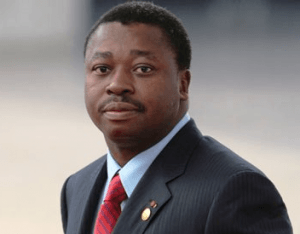The Togo election: Wind of change too weak?

Political campaigns began picking up in Lome ahead of this year’s presidential polls in the tiny West African state of Togo scheduled for April 25.
The poll was originally scheduled for April 15, but was delayed by 10 days after the Economic Community of West African States (ECOWAS) called for the voters lists to be revised. Over 3.5 million voters are expected to cast their votes out of a population of six million.
Posters of the incumbent, Faure Gnassingbe, leader of Union for the Republic Party (UNIR) and four other contestants are already fighting for space in Adidogorme, Kodjoviakope, Asigato, Bagida-Habour area, Atikpodji and Lome-deux all in the Togolese capital.
The campaign is expected to reach its peak this week in all five regions.
Unlike Nigeria, interest among the Togolese citizenry in the elections seems very low, with a good number of electorates seemingly disinterested in the national exercise.
The main opposition, Combat for Political Change’s (CAP) campaign message of “change” and fight against corruption are yet to catch up with the electorate.
CAP appears to be facing logistical constraints and is unsuccessful in winning other smaller opposition parties to its side, while Gnassingbe seems set for the race.
As a result, demand for change is generally perceived too weak to halt the nearly 50 years Gnassingbe “dynasty” in Togolese politics.
President Gnassingbe’s main challenger, Jean-Pierre Fabre, leader of Combat for Political Change has the task of clearing doubts in the minds of the electorate, who appear desirous for change.
The opposition leader’s challenge is that the electorate seem to be in love with Gnassingbe’s massive infrastructural projects such as opening up small towns and farming communities with good road networks.
Fabre also has the task of convincing the electorate that the change he is calling for must happen now and inspire them to come out massively on election day.
The ruling government is coming up against mounting displeasure from the citizenry as schools have been closed down due to protests by teachers over alleged poor conditions of service.
There is also a seeming disunity in the ruling Party in Gnassingbe’s home Region, Kara, following Faure’s arrest of his siblings for political reasons.
These occurrences could cause a problem for President Gnassingbe’s ambition to seek a third term.
However, indications are that Gnassingbe would still conquer Kara and the Region Dela Savane, and make some good showings in the remaining three regions.
The opposition’s strength continues to grow steadily with CAP appearing to be having the upper hand in the Maritime and Plateau Regions, populated predominantly by the Ewe ethnic group, even though it may not get enough votes to counter those from the two northern regions for UNIR.
Region Centrale is expected to be the decider. The two main contenders would have to craftily court the Kotokolis in Sokode and Bassar to win the elections. Already, a lot of last hour jobs-lobbying are being done by the two major parties there, which is obviously the political battle ground.
Just like Nigeria, the opposition has never won elections in Togo, offering Fabre an opportunity to make history.
The country’s first democratically elected president, Sylvanus Olympio was overthrown in 1963 by then Sergeant Etienne Eyadema .
Eyadema as Lieutenant- Colonel again overthrew the government of Nicolas Grunitzky in a bloodless coup on January 13, 1967.
Eyadema later suspended the constitution; banned political parties but succumbed to pressure from the West and legalised opposition parties in 1993 and won the first multiparty elections that same year with 96 per cent votes, a poll that many considered fraudulent.
He won another “fraudulent” election in 1998 but died in February, 2005 after a 38-year rule.
Faure Gnassingbe, Eyadema’s ‘ordained’ son was installed by the military a day after his father’s death, to serve the older Gnassingbe’s remaining term but Faure stepped down a month later following international pressure for an election, which he subsequently won with 60 per cent votes.
He appointed opposition leader, Edem Kodjo as Prime Minister and won another election in 2010.
Togo abolished constitutional term limits in 2002, paving way for Faure to contest a third term, unlike most West African states which limit Presidents to two terms.
Like the outcome of soccer matches, election results in Africa can be really unpredictable. Football teams thought to be under-dogs have pulled surprises on many occasions. In the case of the upcoming Togo poll, however, political analysts are almost certain in their prediction that the wind required to bring about the change envisaged by the opposition might not be strong enough to yield the desired outcome.
Source: GNA
